The Controversial Reason Beyoncé Is the Face of Black Feminism

By:
Even before she released "Lemonade," a visual album packed with feminist symbolism, Beyoncé had been establishing herself as one of the faces of Black female empowerment.
But a recent discussion on the Son of Baldwin Facebook page — a community dedicated to the discussion of "matters of race, sexuality, gender, gender identity, disability, class, and the intersections thereof — has raised some concerns and questions about what it means for a woman who looks like Beyoncé to be positioned at the forefront of the Black feminist movement.
"It's pure colorism that most of our sheroes are light, attractive and young," wrote a commenter named Nefertiti Bashara Muhhamad.
Beyoncé isn't the only Black feminist to raise concerns among Son of Baldwin commenters, who noted that other so-called "sheroes" like Zendaya and Amandla Stenberg also happened to have light skin tones.
"I have no fundamental issue with light skin women being vocal, I mean why would I? But we can be critical of the fact that their critiques are more marketable and their voices are valued above all else," wrote Son of Baldwin commenter Halimat Sayo Alawode.
"Colorism" seems to be at the heart of many community members' critiques.
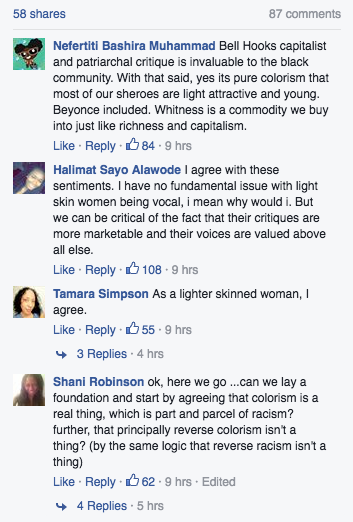 Facebook/ Son of Baldwin - facebook.com
Facebook/ Son of Baldwin - facebook.com
Basically, many believe that colorism is behind the favored status enjoyed by light-skinned women like Beyoncé, compared to Black women with darker complexions.
The Son of Baldwin discussion points out that Beyoncé, Amandla Stenberg, and Zendaya are all light-skinned Black women who are considered beautiful by conventional beauty standards.
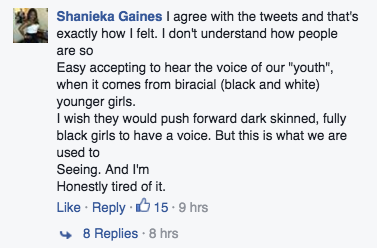 Facebook/Son of Baldwin - facebook.com
Facebook/Son of Baldwin - facebook.com
Comparably, there are very few dark-skinned Black feminists in pop culture who have a large platform.
Underlining the prevalence of colorism in the America, Oxford Dictionary's definition notes that the term is chiefly used in the United States.
"chiefly US
Prejudice or discrimination against individuals with a dark skin tone, typically among people of the same ethnic or racial group:
colorism within the black community has been a serious emotional and psychological battle."
The terms colorism and "light-skinned privilege" illuminate racial prejudices within the Black community, and in the world at large, in which people who more closely resemble white people are believed to more accepted by mainstream society and considered more beautiful.
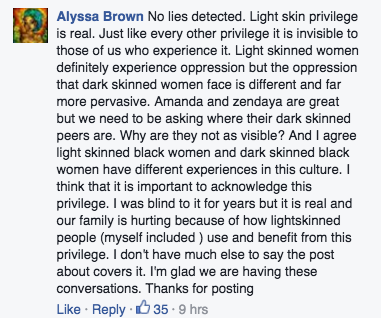 Facebook/Son of Baldwin - facebook.com
Facebook/Son of Baldwin - facebook.com
The lack of diversity in the type of Black women popular culture accepts and listens to means that only one narrow type of Black feminism is perceived as representing everyone.
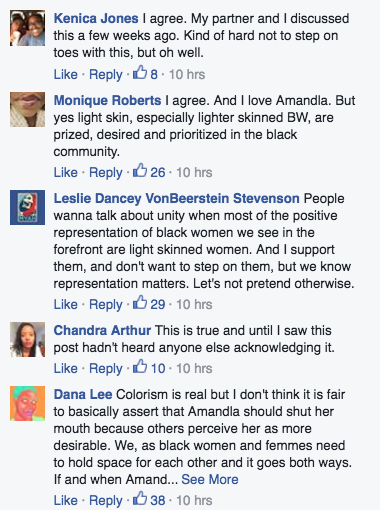 Facebook/Son of Baldwin - facebook.com
Facebook/Son of Baldwin - facebook.com
Although all Black women do share many similar experiences, dark-skinned Black women endure a specific type of racism that is unique to them.
Every day, beauty products, magazines, TV and films are telling dark-skinned Black women that they're not good enough. For example, a Google search for the term "beautiful black American woman" mostly returns images of light-skinned women.
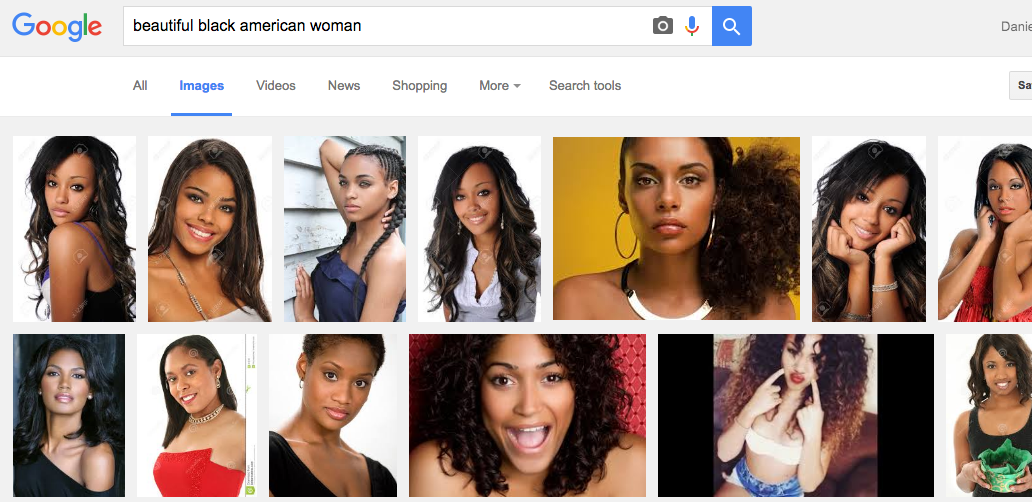 Google - google.com
Google - google.com
The privileges that society gives light-skinned women over dark-skinned women makes it difficult, if not impossible, for them to understand the additional layer of discrimination a dark-skinned woman faces on a daily basis. That's why many people were so upset that a light-skinned woman, Zoe Saldana, was cast to play Nina Simone in the biopic "Nina."
Many of the struggles that Simone faced in her life were based on her dark skin tone. Writer and cultural critic Ta-nehisi Coates, wrote about the importance of Simone's skin tone to her legacy in The Atlantic.
"Simone was able to conjure glamour in spite of everything the world said about black women who looked like her. And for that she enjoyed a special place in the pantheon of resistance. That fact doesn’t just have to do with her lyrics or her musicianship, but also how she looked. Simone is something more than a female Bob Marley. It is not simply the voice: It is the world that made that voice, all the hurt and pain of denigration, forged into something otherworldly."
No matter how you feel about the current light versus dark-skinned debate, the roots of colorism are hundreds of years old. Researcher Margaret Hunter from the Department of Sociology at Mills College wrote about the history of colorism; she explained that colonialism and slavery introduced the hierarchy of skin color within the Black community.
"Colorism for Latinos and African Americans has its roots in European colonialism and slavery in the Americas. Both systems operated as forms of white domination that rewarded those who emulated whiteness culturally, ideologically, economically, and even aesthetically. Light-skinned people received privileges and resources that were otherwise unattainable to their darker-skinned counterparts."
 Wikimedia Commons / Pacha J. Willka - wikimedia.org
Wikimedia Commons / Pacha J. Willka - wikimedia.org
Author Frantz Fanon talked about the affect of colonialism on Black West Indian countries in his 1952 book "Black Skin White Masks." “The colonized is elevated above his jungle status in proportion to his adoption of the mother country's cultural standards,” he wrote.
